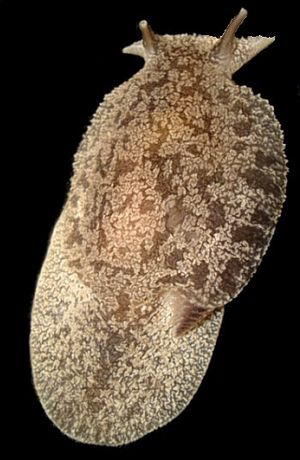Grey side-gilled slug facts for kids
Quick facts for kids Pleurobranchaea maculata |
|
|---|---|
 |
|
| Scientific classification | |
| Kingdom: | |
| Phylum: | |
| Class: | |
| (unranked): | |
| Superfamily: |
Pleurobranchoidea
|
| Family: |
Pleurobranchaeidae
|
| Genus: |
Pleurobranchaea
|
| Species: |
P. maculata
|
| Binomial name | |
| Pleurobranchaea maculata Quoy & Gaimard, 1834
|
|
The Pleurobranchaea maculata, also known as the grey side-gilled slug, is a fascinating sea creature. It is a type of sea slug that lives in the ocean. These slugs are molluscs, just like snails and clams. However, they do not have a shell on the outside of their bodies. This species belongs to a group called Gastropoda, which includes many snails and slugs.
Contents
Where It Lives
This sea slug is naturally found around the North Island and South Island of New Zealand. But in 2009, it was seen far away from its usual home. It appeared on the coast of Argentina. From there, it quickly spread along about 2,000 kilometers (about 1,240 miles) of the southwestern Atlantic coast.
Its Home in the Ocean
You can find the grey side-gilled slug in different parts of the ocean. It lives in harbors where the tide goes in and out. It also lives off rocky coasts. Sometimes, it can be found very deep down, up to 250 meters (about 820 feet) below the surface.
What It Looks Like
This slug does not have a shell, which is common for sea slugs. Its body is a pale grey color. It has many short, brown lines covering its skin, which gives it a patterned look. This sea slug can grow to be up to 100 millimeters (about 4 inches) long.
Life Habits and Diet
This sea slug is a carnivore, meaning it eats other animals. It enjoys eating sea anemones, which are flower-like animals that live in the ocean. It also eats different kinds of marine worms and other molluscs.
Important Safety Information
In 2009, there was a serious concern in the Auckland Region of New Zealand. Several dogs became very sick after eating Pleurobranchaea maculata on beaches. Scientists found that the sea slugs had eaten something that made them poisonous. This poison is called tetrodotoxin.
Because of this, people were asked to be careful on beaches. Pet owners were told to keep their animals away from these slugs. Recreational fishing was also stopped for a short time to ensure everyone's safety. This event showed that even small sea creatures can sometimes carry natural toxins.
See also
 In Spanish: Pleurobranchaea maculata para niños
In Spanish: Pleurobranchaea maculata para niños

